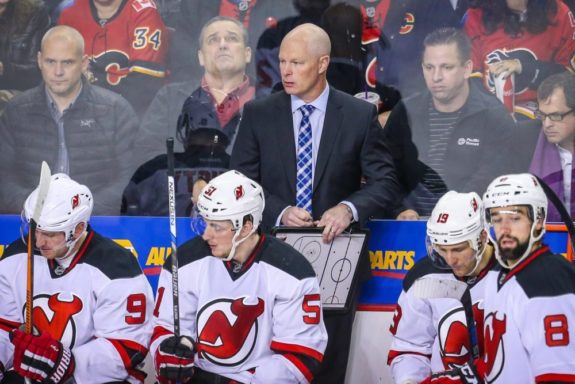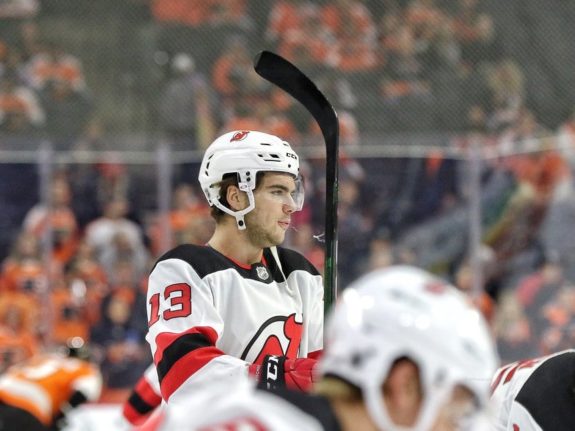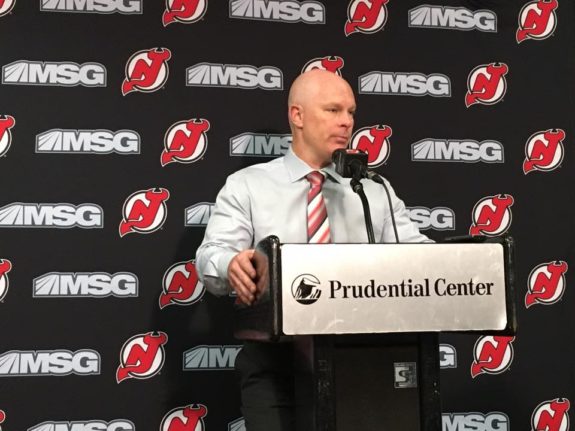In what was a move that was nothing short of expected, the New Jersey Devils relieved John Hynes of his duties as head coach. After an offseason of much fanfare, the Devils got off to a terrible start to the season, with a 9-13-4 record in their first 26 games. Things came to a head when the Devils were blown out 7-1 by the Buffalo Sabres on Monday night.
In a corresponding move, the Devils named assistant coach Alain Nasreddine as interim head coach. Peter Horachek, a pro scout with the Devils, will join Nasreddine’s staff as an assistant coach, along with current assistants Mike Grier and Rick Kowalsky. It may be too late to salvage the season and get into playoff contention, but how the team performs the rest of the way will bear watching. Here’s what to look for over the next few months.
Devils Failed to Generate Offense Under Hynes
If you follow the Devils closely, it wasn’t a secret their offense has suffered this season. They rank 29th in goals per game (2.50), with the Calgary Flames and Detroit Red Wings being the only two teams with a worse rate. The Red Wings aren’t actively trying to win games, so it’s not great when you’re in the same boat as them in terms of scoring goals.

After an offseason that included drafting Jack Hughes with the first overall pick, as well as adding Nikita Gusev, P.K. Subban, and Wayne Simmonds, the Devils’ offense was supposed to be a strength of this team. So why have they struggled so much to score?
The Devils have been among the bottom of the league when it comes to generating five-on-five offense. They rank fifth to last in shot attempts per 60 minutes (CF/60), as well as seventh to last in expected goals for per 60 minutes (xGF/60) this season. But their struggle to generate offense under Hynes wasn’t a one-season problem:
| Stat | Rate | League Ranking Since 2015 |
| CF/60 | 46.05 | Last |
| SF/60 | 25.83 | Last |
| xGF/60 | 1.99 | 29th |
| GF/60 | 1.80 | Last |
Hynes didn’t have much of a roster to work with during his first two seasons as a head coach, so those numbers are understandable. But with all the additions this offseason, there wasn’t any excuse for it to carry over into 2019-20. That seemed to indicate there were some issues with his system rather than it being solely on the team’s roster.
Related: Devils & Hall: What a Deal Might Look Like
That system happened to be one that emphasized low-event hockey. The Devils didn’t give up a ton of shots, but they also didn’t create much, either, since they played at a slow pace and kept shot events to a minimum. It isn’t the sole reason Hynes lost his job, but it certainly contributed to it. So I’d expect some improvement on offense to close out the season.
Young Players’ Regression Was Concerning
The Devils may not have the young talent the Toronto Maple Leafs do, but they still have some key young players that are a significant part of their future. Nico Hischier, the first overall pick in 2017, has not taken the step forward that many thought he would in his third season. He has 15 points in 24 games, a 51-point pace over 82 games, which isn’t terrible. But he’s not had the same impact he did as a rookie or even last season. And his five-on-five production has also fallen since his rookie season.

Jesper Bratt, who burst on to the scene as a rookie in 2017, hasn’t looked the same, either. After finishing with 33 points in 74 games in 2017-18, he produced at a 51-point pace last season, even as he missed close to 30 games due to injury. He has only seven points in 21 games this season and has been a healthy scratch on a few occasions. A new coach and system may benefit him the most, given he’s one of the team’s more-skilled wingers.
Will Butcher is another player who hasn’t quite looked like himself. He had 44 points in 81 games as a rookie in 2017-18, the most by a Devils’ rookie defenseman since Scott Niedermayer totaled 40 in 1992-93. But his production fell last season, and like Hischier, he hasn’t had the same kind of positive impact this season.
Related: Devils’ Downward Spiral Deepens
General manager Ray Shero also had to consider the development of Jack Hughes. He’s been pretty solid, given he’s an 18-year-old who made the jump straight to the NHL from the USHL. But if the stagnation of players like Hischier, Butcher, and Bratt were a problem under Hynes, there’s no reason it couldn’t be a problem for Hughes somewhere down the road. So how they perform during the rest of the 2019-20 season will be worth keeping an eye on with a new coach in place.
Hynes Will Get Another Shot Somewhere
Hynes’ tenure with the Devils may have ended as poorly as possible, but he’s not a bad coach. The Devils were supposed to be a lottery team in 2017-18, but they made the playoffs. Taylor Hall finishing with 93 points, and the Hart Trophy, helped matters. But they were a good team, and Hynes played a part in helping them get to where they did.

Unfortunately, Hynes was brought in during the start of what was a rebuild by Shero. That meant he didn’t have a lot of talent to work with, especially early on, and the losses began to pile up. Things may have reached a breaking point when the Devils won the Draft Lottery this past April for the second time in three tries. That doesn’t happen when you’re winning, and that’s a lot of losing in a short amount of time. That affects the players, and eventually, a coach’s message begins to wear off, which seems to have happened with Hynes and the Devils.
I don’t doubt Hynes can have success as an NHL head coach, but it just wasn’t going to work in New Jersey anymore. He’s only 44 years old, so he’ll get another shot one day. And it wouldn’t be a surprise to see him succeed with whoever it is.
* * *
Advanced stats from Natural Stat Trick, stats in the table from Corsica Hockey